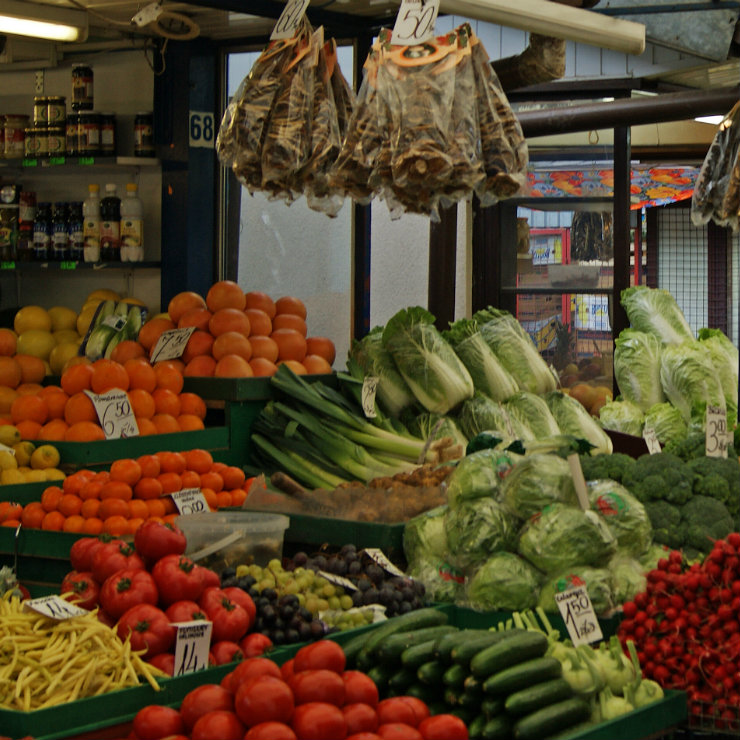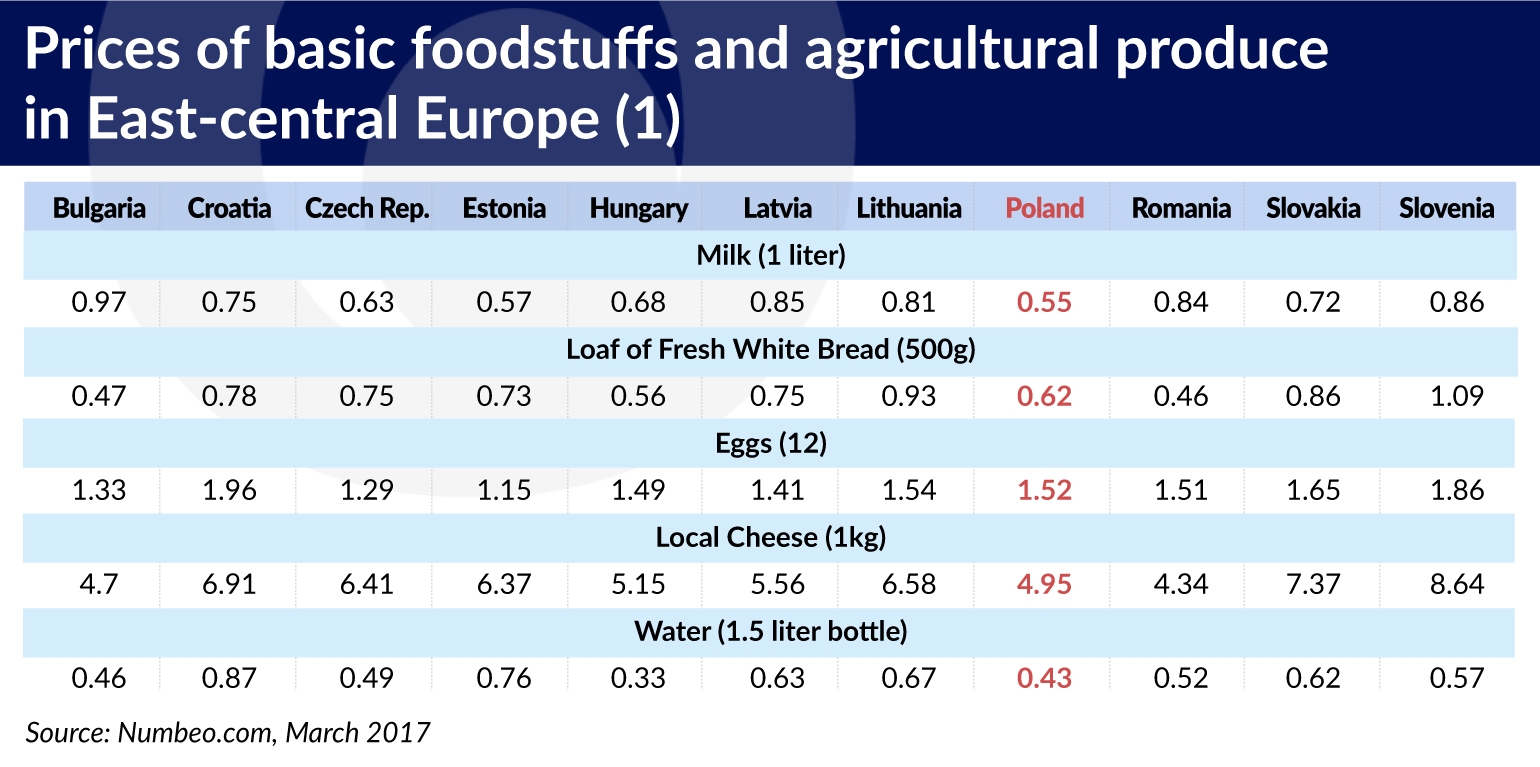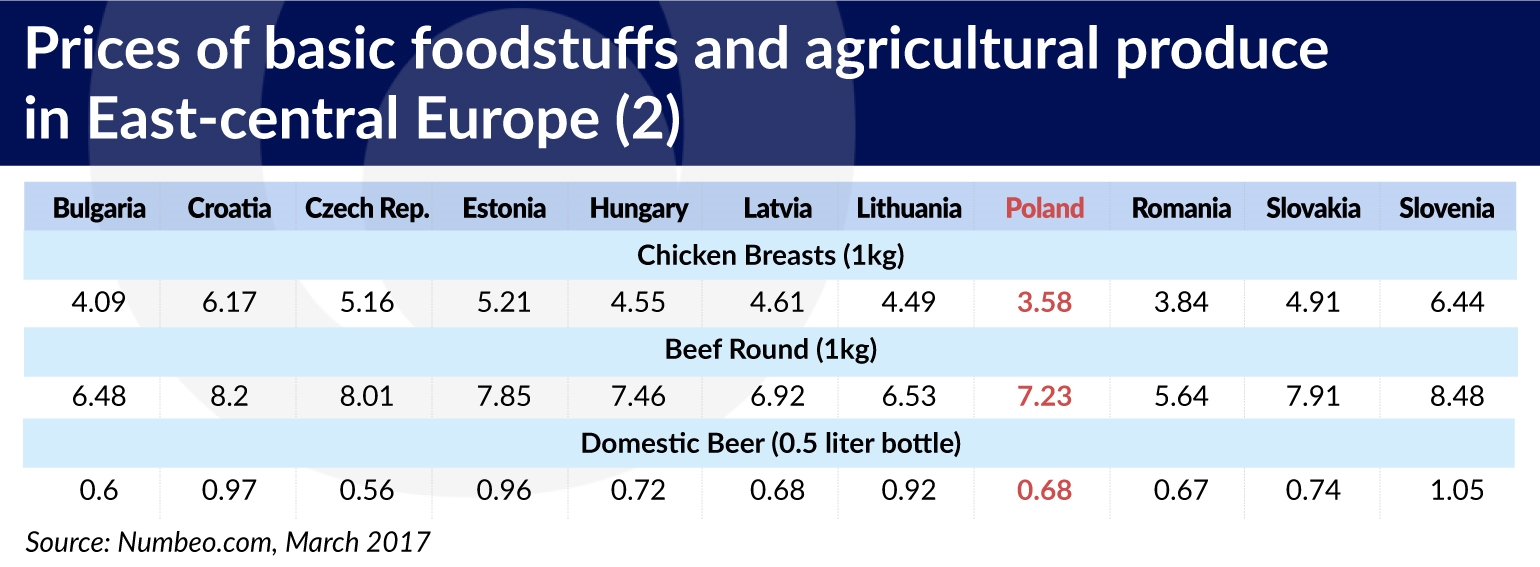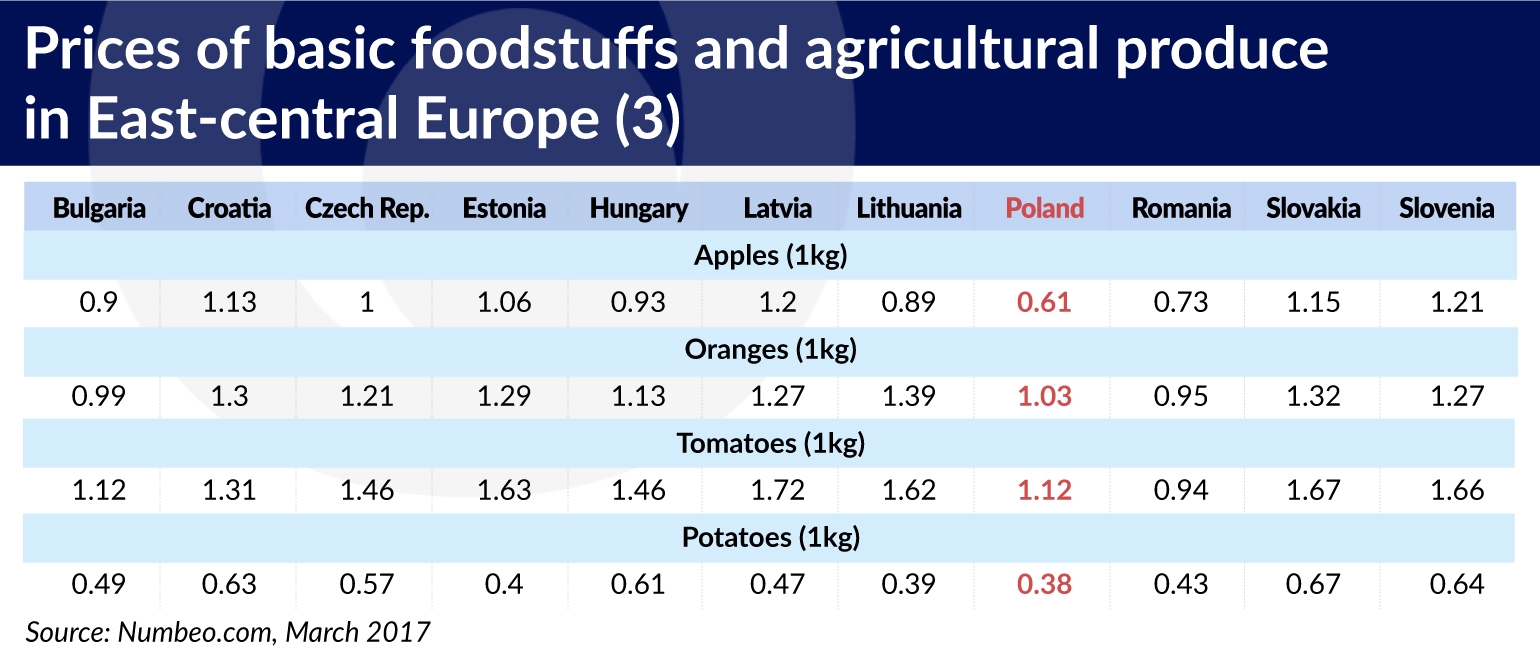Tydzień w gospodarce
Category: Raporty
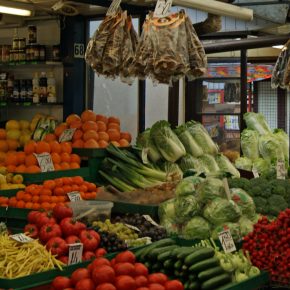
Food market, Cracow, Poland (Zygmunt Put, Zetpe0202, CC BY-SA)
Although for many Westerners new member states of the EU appear to share many similarities (apart from, perhaps, Malta and Cyprus), and are treated as being one and the same, those countries clearly differ in many ways, including their politics, society, and economy. However, it is a well-known fact that salaries in CSE are lower. And the difference in food prices is not linked to the difference in salaries: prices in Lithuania are generally higher than in Poland, but in the latter country the salaries are perceivably higher.
This analysis focuses on twelve foodstuffs and agricultural produce: milk, white bread, eggs, cheese, poultry, beef, apples, oranges, tomatoes, potatoes, water, and beer. We have decided to analyse the prices of these produce in eleven new EU countries, admitted in or after 2004.
At the beginning it is necessary to underscore that while the prices of aforementioned produce in the CSE countries may not seem to vary extremely for Western readers, these divergences can be considered significant for citizens of the new EU member states. It is the reason for which many Czechs, Slovaks, and Lithuanians drive to shopping malls and stores in Polish cities near the border.
To see this, one needs simply to visit the Polish town of Suwałki, located about 30 km from the Lithuanian border. It appears to be increasingly difficult to find a car with Polish number plate parked in front of a shopping center and other retail stores. Most of the customers shopping during weekends are Lithuanians, who choose to shop in Poland due to the relatively high prices in their country. Many of them come to Poland from cities located quite far from the border, such as Vilnius or Kaunas.
According to the data gathered by Numbeo.com, the cheapest milk is in Poland, Estonia, and Czech Republic. The consumers have to pay EUR0.55 in Poland, EUR0.57 in Estonia, and EUR0.63 in Czech Rep. for a liter of milk. Milk is most expensive in Bulgaria (EUR0.97), Slovenia (EUR0.86) and Romania (EUR0.84).
The lowest prices of bread are in Romania (EUR0.46 for loaf of fresh white bread), Bulgaria (EUR0.47) and Hungary (EUR0.56), whereas the highest are in Slovenia (EUR1.09), Lithuania (EUR0.93) and Slovakia (EUR0.86).
It can be something of a surprise that the lowest average price of eggs is in Estonia (EUR1.15 for 12 eggs), Czech Rep. (EUR1.29), and Bulgaria (EUR1.33). Eggs are on average the most expensive in Croatia (EUR1.96), Slovenia (EUR1.86) and Slovakia (EUR1.65).
Romania has the cheapest cheese. The average price for 1 kg of local cheese amounts to just EUR4.34. Cheese is also relatively cheap in Bulgaria (EUR4.70) and Poland (EUR4.95). The highest average prices for local cheese are in Slovenia (EUR8.64), Slovakia (EUR7.37) and Croatia (EUR 6.91).
Water is a necessity. A 1.5 liter bottle of water is the least expensive in Hungary. Hungarians pay for it only EUR0.33. Water is not expensive in Poland (EUR0.43) or in Bulgaria (EUR0.46). The most expensive 1.5 liter bottle of water is in Croatia (EUR0.87), Estonia (EUR0.76) and in Lithuania (EUR0.67).
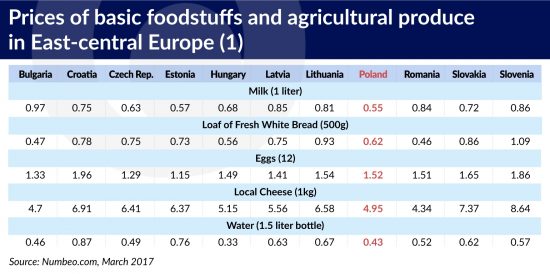
Poland has the lowest average price of chicken breast. Poles have to pay EUR3.58. Romanians EUR3.84. and Bulgarians EUR4.09 for 1 kg of chicken breast. It is most expensive in Slovenia (EUR6.44), Croatia (EUR6.17) and Czech Rep. (EUR5.16).
The cheapest beef can definitely be found in Romania. Romanians pay the average of EUR5.64 for 1 kg of beef round. Beef is relatively cheap in Bulgaria (EUR6.48) and Lithuania (EUR6.53), and the most expensive in Slovenia (EUR8.48), Croatia (EUR8.20) and Czech Rep. (EUR8.01).
Meanwhile, although beer may not be a basic necessity, it appears to be the favorite alcohol of many Europeans. It is no surprise that the lowest average price for a 0.5 liter bottle of beer is in the country well-known for its beers: the Czech Republic. Czechs have to pay only EUR0.56 for a 0.5 liter bottle. Beer is also quite cheap in Bulgaria (EUR0.60) and Romania (EUR0.67). The most expensive beer is in Slovenia (EUR1.05), Croatia (EUR0.97), and Estonia (EUR0.96).
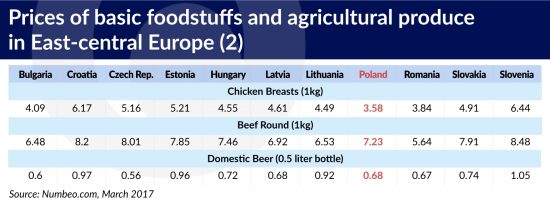
It is no surprise that the cheapest apples are in Poland, which is the world’s fourth largest apple producer (after China, United States and Turkey). The average price of 1 kg of apples in Poland EUR0.61. In Romania it is EUR0.73 and EUR0.89 in Lithuania. They are the most expensive in Slovenia (EUR1.21), Latvia (EUR1.20), and Slovakia (EUR1.15).
The lowest prices for 1 kg of oranges are in Romania (EUR0.95), Bulgaria (EUR0.99), and Poland (EUR1.03). The highest prices of oranges are in Lithuania (EUR1.39), Slovakia (EUR1.32), and in Croatia (EUR1.30), which is surprising, because Croatia grows its own oranges (due to its climate and the location on the Adriatic Sea coast).
The cheapest tomatoes are available in Romania (EUR0.94), Poland (EUR1.12), and Bulgaria (EUR1.12), whereas the most expensive are in Latvia (EUR1.72), Slovakia (EUR1.67), and Slovenia (EUR1.66).
Potatoes are the cheapest in Poland (EUR0.38), Lithuania (EUR0.39) and Estonia (EUR0.40). The highest price is paid by the citizens of Slovakia (EUR0.67), Slovenia (EUR0.64) and Croatia (EUR0.63).
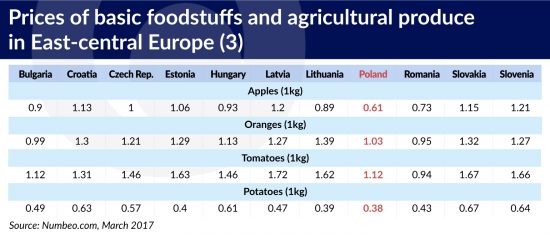
Looking at all the data Poland, Romania, and Bulgaria generally have the cheapest basic food and agricultural products. The most expensive ones are in two former republics of Yugoslavia: Slovenia and Croatia. However Slovakia and the three Baltic States (Estonia, Latvia and Lithuania) are also quite expensive when it comes to this kind of goods.
Out of the six countries five are in the Eurozone (only Croatia still retains its own currency). Although the prices depend upon many factors (VAT rate, local production, competition between retailers, transportation, etc.), it seems that joining Eurozone was not beneficial for consumers in the CSE.
Michał Kowalczyk is a PhD student at the History and Social Science Department of the Cardinal Stefan Wyszyński University in Warsaw. He specializes in Hungarian and Central European politics.
